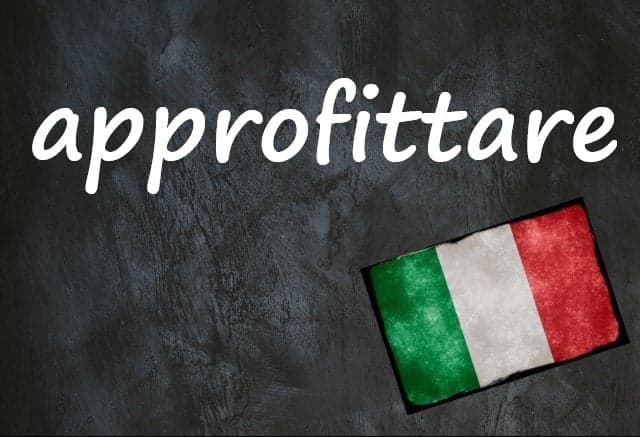Italian word of the day: 'Approfittare'

Take advantage of this chance to learn a very useful Italian word.
If you had to guess the meaning of today's word in English, you might say “profit”. And that is almost what it means.
Approfittare (hear it pronounced here) has the same Latin root as profit, but as is so often the case, the meaning has shifted. The modern Italian word can mean 'make the most of”, “take advantage of”, "profit from" or “exploit” - taking on darker shades depending on the context.
- Devo approfittare del silenzio per leggere un libro
- I should take advantage of the silence to read a book
- Approfittiamo della bella giornata e andiamo al parco
- Let's make the most of this nice day and go to the park
- Non si deve approfittare della buone fede altrui
- One should not take advantage of the good faith of others
- Ha approfittato della sventura degli altri
- He profited from the misfortune of others
That person who takes advantage of others could be called an approfittatore: an “exploiter” or “opportunist”.
And there's also an imperative phrase, which is the sort of thing you might want to say on the last day of an Italian holiday:
- Approfittane!
- Make the most of it!
Do you have a favourite Italian word you'd like us to feature? If so, please email us with your suggestion.
Comments
See Also
If you had to guess the meaning of today's word in English, you might say “profit”. And that is almost what it means.
Approfittare (hear it pronounced here) has the same Latin root as profit, but as is so often the case, the meaning has shifted. The modern Italian word can mean 'make the most of”, “take advantage of”, "profit from" or “exploit” - taking on darker shades depending on the context.
- Devo approfittare del silenzio per leggere un libro
- I should take advantage of the silence to read a book
- Approfittiamo della bella giornata e andiamo al parco
- Let's make the most of this nice day and go to the park
- Non si deve approfittare della buone fede altrui
- One should not take advantage of the good faith of others
- Ha approfittato della sventura degli altri
- He profited from the misfortune of others
That person who takes advantage of others could be called an approfittatore: an “exploiter” or “opportunist”.
And there's also an imperative phrase, which is the sort of thing you might want to say on the last day of an Italian holiday:
- Approfittane!
- Make the most of it!
Do you have a favourite Italian word you'd like us to feature? If so, please email us with your suggestion.

Join the conversation in our comments section below. Share your own views and experience and if you have a question or suggestion for our journalists then email us at [email protected].
Please keep comments civil, constructive and on topic – and make sure to read our terms of use before getting involved.
Please log in here to leave a comment.